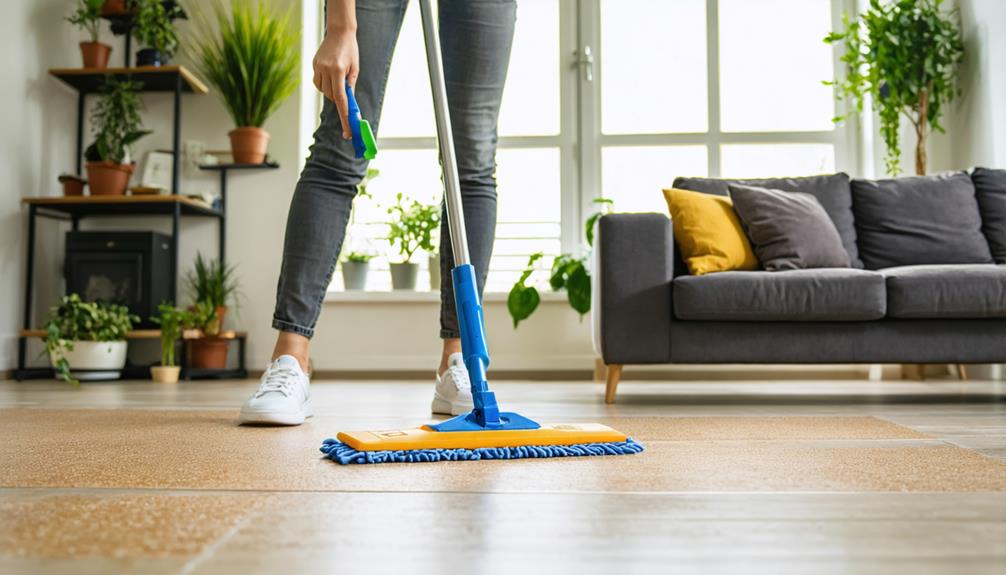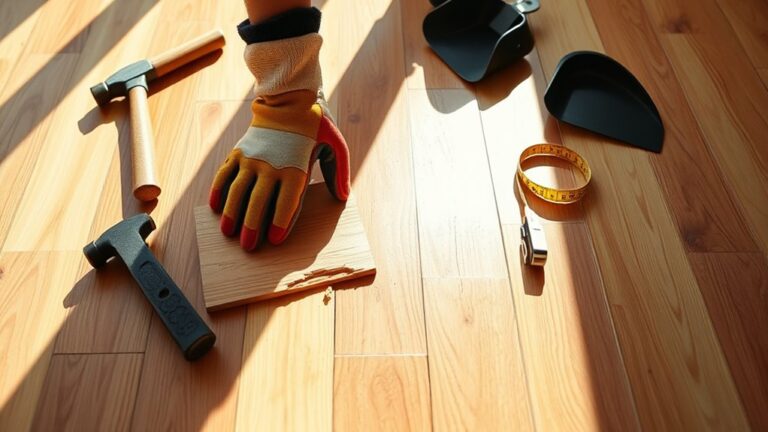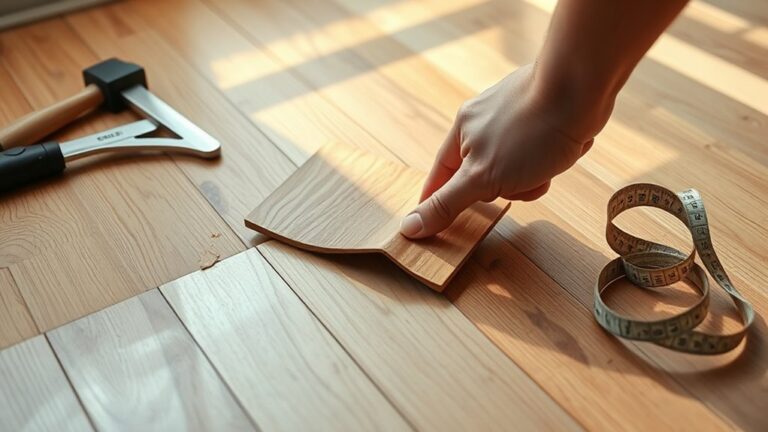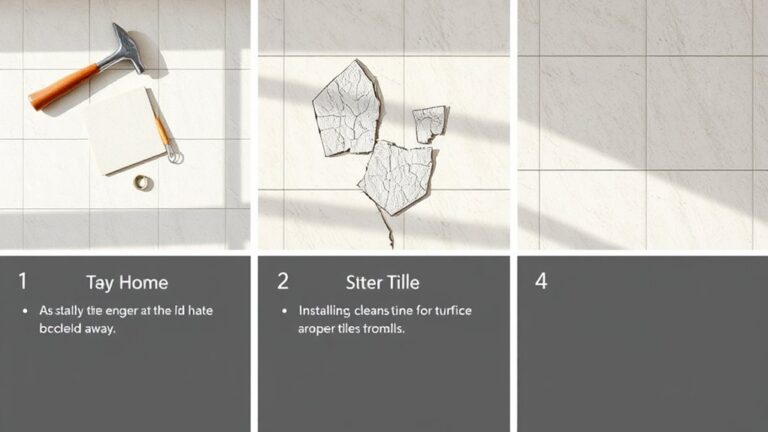To clean cork floors without damaging them, use a pH-neutral cleaner, like Bona. Avoid ammonia-based or abrasive products as they can harm the finish. Apply the cleaner to your mop to prevent oversaturation, and always clean up spills immediately to prevent moisture damage. A damp mop is ideal for regular cleaning; make sure you do this weekly. Inspect the sealant every few years for maximum protection. Using felt pads under furniture helps reduce scratches. This maintenance approach preserves the floor's appearance and longevity. For further insights on care and maintenance practices, you'll find additional useful information.
Overview of Cork Flooring
Cork flooring is a sustainable choice, crafted from the bark of cork oak trees, which regenerates over time, making it an eco-friendly material. This unique flooring option not only contributes to environmental conservation but also offers an array of aesthetic qualities. High-quality cork flooring is available in various colors and textures, allowing you to enhance your home's design while remaining environmentally friendly.
In addition to its visual appeal, cork provides natural insulation, helping to reduce energy costs by maintaining a comfortable living environment. Its soft underfoot feel adds to the comfort, making it a popular choice for residential spaces. One of the standout features of cork is its hypoallergenic nature; it naturally resists mold and mildew, creating a healthier living space for those with allergies.
Maintaining cork is straightforward. You'll find that cleaning cork floors requires minimal effort, similar to tile or wood. Regular cleaning not only enhances its appearance but notably extends its longevity. To maintain a cork floor, a simple routine involving sweeping or vacuuming followed by damp mopping can be effective.
Investing in cork flooring means choosing a product that combines beauty, comfort, and sustainability. By selecting high-quality cork flooring, you're not only making a stylish choice but also one that supports a healthier environment. With proper care and attention, your cork floors will remain a beautiful and functional element of your home for years to come.
Choosing Safe Cleaning Products
When choosing cleaning products for your cork floors, it's essential to select pH-neutral cleaners like Bona and Basic to protect the finish. Steer clear of ammonia-based or abrasive cleaners, as they can damage the surface and degrade over time. Additionally, always apply cleaners directly to your mop head rather than spraying them on the cork to avoid oversaturation.
Recommended Cleaner Brands
Selecting the right cleaning products is vital for maintaining the beauty and durability of cork floors. To guarantee effective cork floor cleaning, opt for pH-neutral cleaners specifically designed for cork, such as Bona and Basic. These products are formulated to protect the surface finish without causing damage. Always check that any cleaning product you choose is manufacturer-approved; this is critical for maintaining warranty conditions and protecting the integrity of your cork flooring.
Avoid ammonia-based or harsh abrasive cleaners, as they can harm the cork surface and diminish its appearance over time. For general cleaning, consider multipurpose solutions like Hilway Direct, which are safe for both cork and hardwood floors. These products not only clean effectively but also preserve the natural beauty of your cork.
Remember to follow the manufacturer's instructions for any cleaning product to guarantee its safe and effective use on cork flooring. By choosing the right brands and formulations, you can keep your floors looking pristine and extend their lifespan while enjoying the freedom of a clean living space.
Avoiding Harsh Chemicals
How can you guarantee the longevity of your cork floors while keeping them clean? By choosing cleaning products wisely, you can maintain your cork floor's integrity and appearance. Always opt for pH-neutral cleaners specifically designed for cork, like Bona or Basic. These products help remove dirt and debris without causing damage to the floor's finish or voiding any warranty coverage.
Steer clear of ammonia-based solutions and harsh chemicals, as they can strip the protective sealant and lead to deterioration of the cork surface over time. While mild detergents and neutral floor cleaners are generally acceptable, it's crucial to follow the product instructions to guarantee safe and effective cleaning.
When applying your chosen floor cleaner, never spray it directly onto the cork surface. Instead, apply the cleaner to your mop head to control the amount of liquid used. Consistent use of inappropriate products can create long-term damage, as cork is sensitive to excess moisture and harsh chemicals. By making informed choices in your cork floor maintenance routine, you can protect your investment and enjoy your floors for years to come.
Safe Application Techniques
Maintaining the integrity of your cork floors hinges on employing safe application techniques during cleaning. To effectively clean cork floors without compromising their finish, you need to choose the right products and methods. Here are essential tips to keep in mind:
- Select pH-neutral cleaners: Use products specifically designed for cork, like Bona or Basic, to avoid damaging the floor's finish.
- Avoid harsh chemicals: Steer clear of ammonia, bleach, or any abrasive cleaners that can degrade cork's natural properties and lead to discoloration.
- Use damp mops: Always clean with a damp mop fitted with a wrung-out cloth. Excess water can seep into the cork, causing damage.
- Test new products: Before applying any new floor cleaners, test them in a discreet area to verify compatibility and safety for cork surfaces.
Following these guidelines not only helps protect the floor but also maintains the warranty conditions of your cork flooring. Remember to also use furniture pads to prevent scratches and damage from heavy items. By taking these precautions, you can enjoy beautiful, clean cork floors for years to come.
Essential Cleaning Techniques
To keep your cork floors in ideal condition, you need to use the right cleaning products and establish a regular cleaning routine. Aim to sweep or vacuum at least once a week, and utilize a damp mop with a pH-neutral cleaner for deeper cleans. By adhering to these guidelines, you'll prevent damage and maintain the floor's appearance effectively.
Safe Cleaning Products
Cork flooring requires careful attention when it comes to cleaning products to preserve its unique qualities. To maintain the integrity of your cork floors, it's crucial to use products specifically designed for this material. Here are some guidelines for selecting safe cleaning products:
- Choose pH-neutral cleaners: Opt for brands like Bona or Basic, as they're formulated to protect the cork finish without voiding warranties.
- Avoid harsh chemicals: Stay away from ammonia and bleach, which can degrade cork surfaces, leading to discoloration and damage over time.
- Apply cleaners correctly: Instead of spraying directly onto the floor, apply the cleaner to the mop head to prevent oversaturation and moisture damage.
- Use a gentle cleaning solution: A mixture of warm water and 0.25 cups of white vinegar per gallon provides effective, gentle cleaning. Make sure to mop with a damp cloth rather than soaking the floor.
Always test any new cleaning product in a hidden area first to verify it won't harm your cork surface. By following these guidelines, you can enjoy the beauty of your cork flooring while keeping it in excellent condition.
Cleaning Frequency Guidelines
Regular cleaning is essential for preserving the beauty and durability of your cork floors. To maintain their pristine condition, you should sweep or vacuum at least 2-7 times per week. This helps remove dust and debris, preventing scratches and unnecessary wear. It's important to wipe up spills immediately with an absorbent cloth. This will prevent moisture from penetrating the cork, which can damage the sealant integrity over time.
You'll want to damp mop your cork floors weekly using a pH-neutral cleaner mixed with warm water. This method keeps your surfaces clean without oversaturating them. For deeper cleaning, every 4-6 months, utilize specialized cork floor cleaners to enhance the appearance and longevity of your floors.
Preventing Damage to Cork Floors
Maintaining the integrity of cork floors is vital for their longevity and appearance. To prevent damage, you should adopt a few care strategies that protect your investment. Here's a concise list of actionable steps:
- Use pH-Neutral Cleaners: When cleaning cork floors, always opt for a pH-neutral cleaner. Harsh chemicals can degrade both the finish and structure over time, leading to costly repairs.
- Inspect Sealant Regularly: It's important to regularly inspect the integrity of the sealant on your cork surfaces. A well-maintained seal prevents moisture absorption, which can cause warping and other issues.
- Utilize Felt Pads: Place felt pads under furniture to minimize scratches and indentations. Always lift heavy items instead of dragging them across the cork surface to maintain its pristine condition.
- Avoid Abrasive Substances: Keep your cork floors clear of abrasive materials such as grit and sand. These can create microscopic scratches that dull the finish and detract from the beauty of your floors.
Additionally, protect your cork floors from direct sunlight. Prolonged exposure can lead to fading and uneven color, so consider using window treatments to help maintain a consistent appearance. By following these guidelines, you'll guarantee that your cork floors remain beautiful and functional for years to come.
Moisture Management Tips
Effective moisture management is essential for preserving the beauty and durability of cork floors. To prevent warping and damage, avoid installing cork flooring in areas prone to excessive moisture, such as bathrooms and basements. Maintaining humidity levels between 30% and 60% year-round is critical; this range helps prevent cork from curling or cracking due to excessive dryness or humidity.
During installation, always use a vapor barrier if moisture levels exceed the manufacturer's recommendations. This barrier acts as a protective shield against moisture that could seep into the cork, causing irreversible damage. Proper ventilation is also imperative. Make certain that areas with cork flooring have adequate airflow to minimize moisture buildup and reduce the risk of mold growth, which can compromise both aesthetics and health.
In spaces prone to spills, like kitchens, use breathable mats at sink areas. These mats catch spills while allowing moisture to evaporate, thereby protecting your cork flooring from water damage. Regularly check your flooring for any signs of moisture accumulation, such as discoloration or odor, and address these issues promptly.
Maintenance and Care Practices
Cork floor care requires a systematic approach to guarantee its longevity and aesthetic appeal. By following a few essential maintenance and care practices, you can keep your cork floors looking great while protecting them from damage.
- Regular Cleaning: Sweep or vacuum your cork floor at least once a week. This helps remove abrasive particles that can scratch the surface, thereby maintaining its finish.
- Damp Mopping: When it's time to clean a cork floor, use a damp mop with a pH-neutral cleaner specifically designed for cork. This avoids harsh chemicals that can damage the finish while assuring effective cleaning.
- Immediate Spill Management: Wipe up spills immediately with a soft cloth. This is vital to prevent moisture from penetrating the cork, which could lead to damage over time.
- Water Control: Be cautious with water usage. Avoid excessive water during cleaning; wring out mops thoroughly to prevent oversaturation, which can warp the cork and compromise its integrity.
Additionally, make it a habit to inspect and maintain the sealant on your cork floors every few years. This will guarantee long-lasting protection against wear and tear, contributing to maintaining cork floors in ideal condition. By adhering to these practices, you'll preserve the beauty and functionality of your cork flooring for years to come.
Troubleshooting Common Issues
Even with proper maintenance and care, cork floors can encounter various issues over time. Understanding how to troubleshoot these common problems can help you maintain the beauty and functionality of your flooring.
Scratches are a frequent concern. For light scratches, consider using a cork floor repair product like Tibet Almond Stick. However, deeper gouges may require wood patching compounds for effective restoration. Discoloration might signal sun damage; using window treatments can protect your cork floors from UV exposure and prevent further fading.
Moisture issues can arise, particularly if tiles lift. Regular inspections will help you identify and resolve potential moisture problems before they escalate. If you notice dents from heavy furniture, regularly shift items slightly and use furniture coasters or felt pads. These solutions help distribute weight and minimize pressure on the cork surface.
Spills can be particularly damaging, especially on unsealed cork floors. If spills occur, clean them promptly to prevent water damage, as unsealed areas can absorb moisture, leading to more significant issues. To prevent dirt and grit from scratching your flooring, consider placing mats at entry points.
Frequently Asked Questions
What Is the Best Cleaner for Cork Floors?
When considering the best cleaner for cork floors, you should opt for natural cleaning solutions that are eco-friendly. For effective cork floor maintenance, use products like Bona that respect protective coatings. Incorporating proper cleaning techniques is crucial; avoid common mistakes like using harsh chemicals or excessive water. These can damage the cork surface. Always read the manufacturer's instructions to guarantee you're using safe and effective cleaners that maintain your cork floor's integrity.
Can I Use Swiffer Wet on Cork Floors?
You shouldn't use Swiffer Wet mops on cork floors. For effective cork floor maintenance and care, choose cleaning tools that won't cause damage. Using a damp mop with a pH-neutral cleaner is ideal, as it prevents moisture buildup and protects your floors' sealant. Regular cleaning frequency is essential for maintaining the natural beauty of cork, allowing you to enjoy its benefits without compromising its integrity. Always prioritize damage prevention in your cleaning routine.
Can Murphy's Oil Soap Be Used on Cork Floors?
You shouldn't use Murphy's Oil Soap on cork floors. For cork floor maintenance, opt for pH-neutral, eco-friendly cleaners designed specifically for cork. These natural cleaning solutions help preserve the flooring's integrity while preventing moisture damage. Follow cleaning frequency tips to keep your floors looking great without dulling their finish. Embracing proper cork floor care not only enhances the benefits of cork flooring but guarantees its longevity and beauty in your space.
Does Vinegar Damage Cork?
You might think vinegar's a natural cleaning solution, but when it comes to cork, it's a different story. Vinegar can damage cork flooring, breaking down the sealing and compromising its durability. For effective cork floor maintenance, stick to pH-neutral cleaners that preserve the cork floor benefits. These pet-friendly options guarantee your floors remain safe and clean without the sticky residue vinegar leaves behind. Opt for solutions that respect the integrity of your beautiful cork floors.




